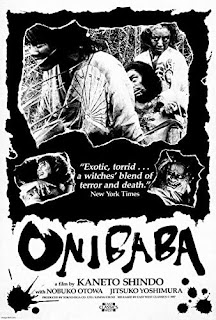This is my favorite time of year, second only to Christmas. Autumn has arrived, the weather is cooling down, and October becomes the month-long celebration of scary movies called Shocktober. So, in the days leading up Halloween I’ll be posting some horror movie recommendations to help you celebrate Shocktober.
Night 7: Japanese Horror Night
“The Hole, deep and dark. Its darkness has lasted since ancient times.”
Onibaba
For most of its runtime, the period Japanese film Onibaba does not feel like a horror movie. Then the final act puts its characters in an unsettling situation and unleashes chilling and frightening imagery. Onibaba, which translates to Demon Woman, was directed by Kaneto Shindo, who also directed one of my favorite Japanese horror movies, Kuroneko (Black Cat), a moody and haunting ghost story. While Onibaba takes its time before delving into horror, the entire film is dark and eerie.
Set in war torn feudal Japan, two women, one older (Nobuko Otowa) and one younger (Jitsuko Yoshimura), live in a hut in a seemingly endless field of tall grass. They survive by ambushing and killing samurai soldiers lost in the grass and selling their armor and weapons for food. They dispose of the bodies by dumping them in a mysterious pit also in the field of grass. Neither of the women are given names but we learn that they are in-laws. Their son and husband, Kichi, was kidnapped, along with his friend Hachi (Kei Satô), and forced to join a warlord’s army. Only Hachi returns. The mother is immediately suspicious of Hachi and even thinks he may be responsible for her son’s death. She also immediately notices that Hachi is flirtatious with her daughter-in-law. Hachi is a gross, lascivious scoundrel but the daughter-in-law is attracted to him anyway, perhaps because he is the only man close to her age not away at war. It is unclear if the mother is jealous of Hachi’s attraction to her daughter-in-law or if she is just afraid of being left to fend for herself. The daughter-in-law sneaks out at night and runs through the reeds to Hachi’s hut and they begin a torrid affair. Soon after, the mother begins telling her daughter-in-law about demons and ghosts and punishments for sins.
The turn to horror comes when a lone samurai general breaks into the mother’s hut while her daughter-in-law is with Hachi. The samurai wears an odd, creepy mask that he refuses to take off because he claims it protects his beauty. The mother eventually steals the mask and uses it to appear as a demon in the field of grass blocking her daughter-in-law’s way to Hachi’s hut. This plan works, until it goes horribly wrong. The mask is so strange that it might be comical if it wasn’t so creepy. Even though you know it is just the mother in disguise, the image of her appearing out of the dark floating through the grass wearing the mask and long robes is still scary.
The unnatural black hole in the sea of swaying grass is completely incongruous with the surrounding landscape; it’s an uncanny sight. The tall grass looms ominously over the heads of the characters and sways hypnotically in unceasing whistling winds. That constant whistling becomes part of the soundtrack and the world of the characters. The moody atmosphere this creates in just the opening shots never abates, even when the characters are indoors. Every image, eerie or normal, is beautifully photographed in high contrast black and white by cinematographer Kiyomi Kuroda. In certain shots the background is pitch black so it looks like the actors are on a bare stage. The ending is abrupt and disquieting; it’s final image and dialogue are haunting. Through atmosphere and a few well selected visuals Onibaba and Kuroneko create memorable and frightening movie watching experiences.




No comments:
Post a Comment